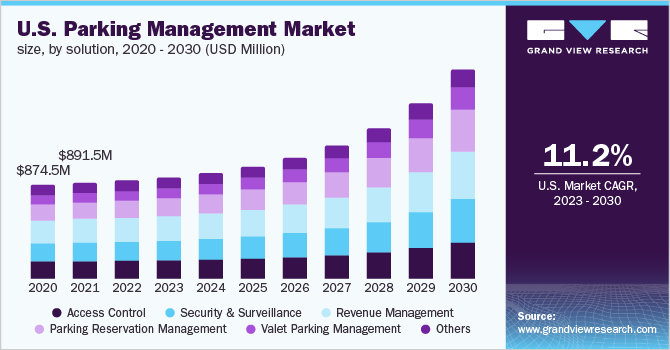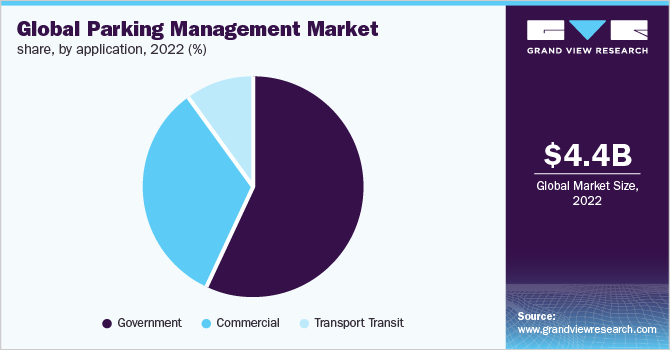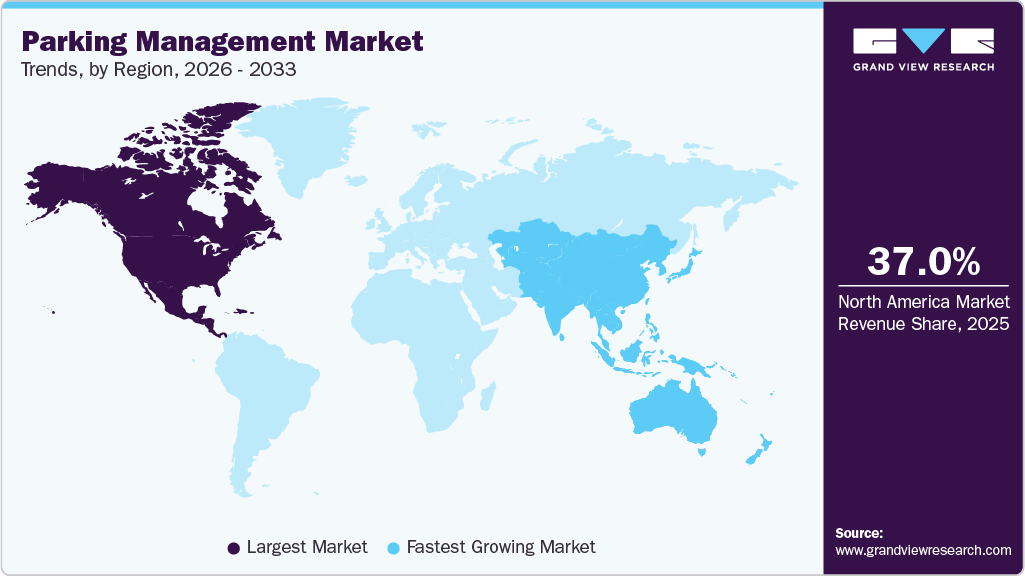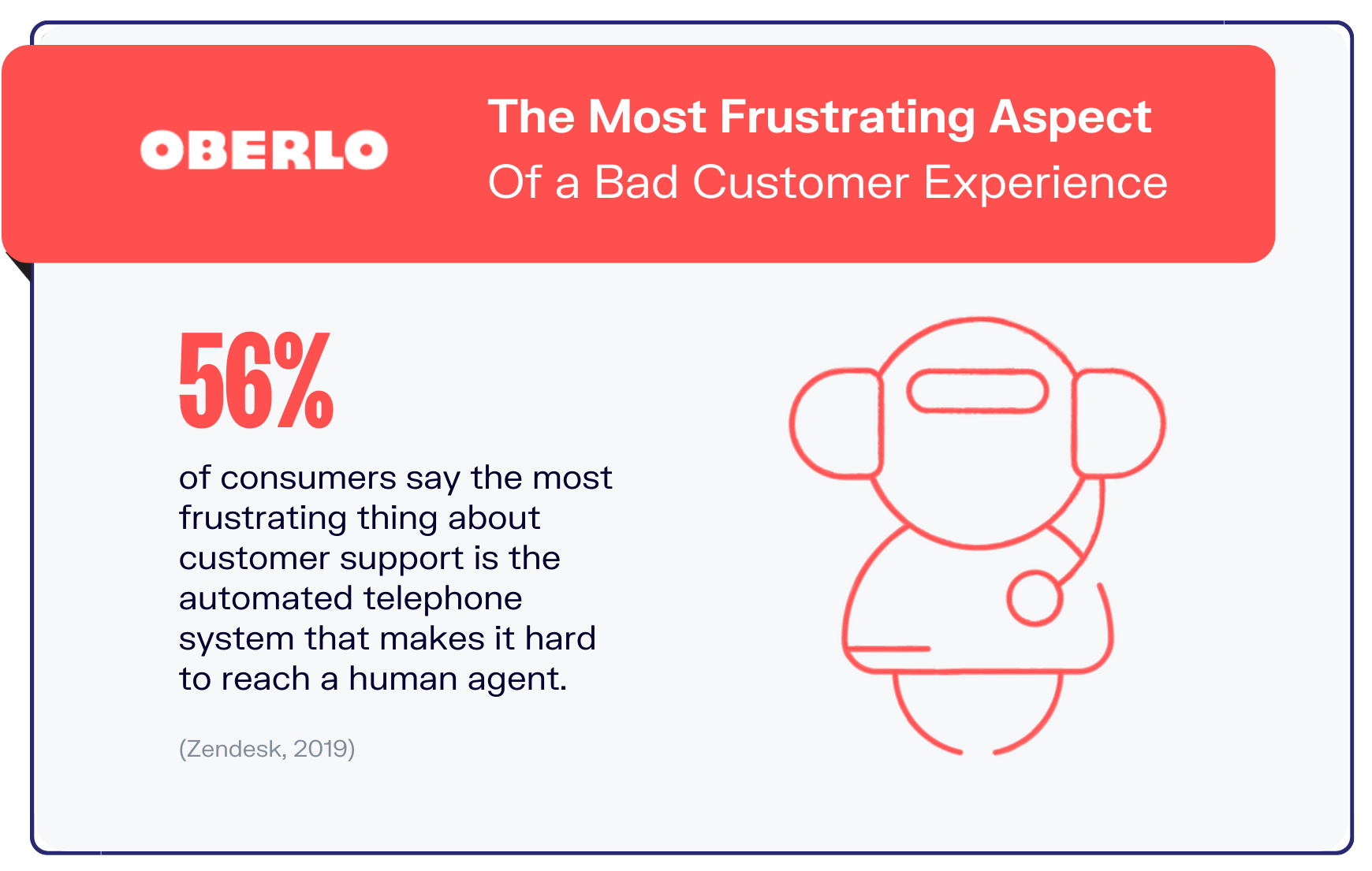The parking lot industry is a major market in the United States. As urban populations grow and land availability decreases, the demand for parking continues to increase. Currently, projections show the global market reaching $20.3 billion by 2032.

Launching a profitable parking operation requires careful planning and preparation. You need to research and select an appropriate location, equipment, and parking layout to accommodate customer demand. It’s also vital to understand local zoning laws and obtain necessary permits and licenses.
This guide will walk you through how to start a parking lot business. Topics include how to market your parking services, scoping out local competitors, opting into business insurance, registering your EIN, and forming a legal business entity.
1. Conduct Parking Lot Market Research
Market research is essential to parking lot businesses. It offers insight into local trends in parking services, your target market, and local market saturation. All market research helps develop a well-rounded business plan to get your parking lot business off the ground.

Some details you might learn about opening a successful parking lot business through market research include:
- The industry has exhibited consistent and steady growth over the past five years.
- There’s a huge market in shopping malls and commercial real estate parking lots. By the square foot, these lots offer more income for small business owners in the parking industry.
- Revenue has grown at an annualized rate of 1.5-2.5% to reach current levels due to increasing construction activity and vehicles per household across the country.
- Key external drivers fueling this growth include rising urban density, increasing vehicle ownership, constrained supply of parking in cities, and greater consumer spending power.
- With more people moving to cities and owning cars, demand for convenient parking access continues rising.
- Supply constraints further increase the value of existing parking real estate in prime locations.
- Well-run operations can expect 20-25% profit margins. This gives parking lots high cash flow potential from both monthly permit holders as well as single-use customers.
- The relatively low capital requirements to start also create an attractive business model.
- Basic needs include payment collection systems, lighting, security cameras, paint for parking space delineations, and insurance.
- startup costs often range from $50,000-500,000.
Given the essential nature of parking and rising urbanization trends, the industry outlook remains overwhelmingly positive. With careful planning and execution, parking lot operation is an appealing small business opportunity in terms of startup costs, profitability, cash flow, and future growth prospects.
2. Analyze the Competition
Understanding the competitive landscape is critical for any new parking lot operation. When assessing competition, start by identifying other lots in the immediate vicinity and within a several-block radius.

For brick-and-mortar analysis, conduct an on-foot evaluation examining factors like location, lot size, parking space delineations, payment systems, security features, and overall capacity. Also, note current utilization rates during peak periods. This direct observation will give a sense of competitors’ existing customer base and market position versus your own planned lot.
You can supplement the in-person analysis by researching lots online. Search Google Maps and review sites like Yelp to find additional neighborhood parking options. Compile details around pricing, hours of operation, and customer feedback.
It’s also constructive to evaluate competitors’ digital presence and marketing efforts. Search for their website and social media pages through tools like Sprout Social. Examine their online content strategy in areas like SEO optimization, search visibility, and consumer engagement. This can uncover opportunities to differentiate your own lot’s customer acquisition and branding strategy.
Analyzing competition on both a tangible and digital basis provides tremendous insights pre-launch. You can identify potential customer targets not properly served and weaknesses to capitalize on.
3. Costs to Start a Parking Lot Business
When launching a parking lot venture, there are a variety of one-time startup and recurring monthly expenses to consider. Carefully estimating these costs is imperative for securing financing, budgeting properly, and ensuring adequate profitability.
Start-up Costs
- Land Acquisition – A small 25-space lot may require 2,500 sq ft for a land cost of $50,000-125,000. Larger lots with 100+ spaces often exceed $500,000.
- Initial Construction & Equipment – After acquiring land, key startup steps involve paving, striping parking delineations, and installing payment kiosks. These construction-related costs generally total $15,000-30,000.
- Permits & Licenses – Most cities and counties require permits and business licenses to operate a commercial parking lot. These administrative fees are typically a few thousand dollars.
- Insurance – General liability insurance is necessary to cover premise dangers, damage to vehicles, and other issues customers may face. Quotes for $1 million policies generally start around $2,000-$2,500 per year.
- Professional Services – Consultants like attorneys and accountants guide business formation, taxes, and regulatory compliance. Expect one-time fees of $3,000-$5,000.
- IT & Admin Costs – Basic IT infrastructure like computers, internet, and a printer/copier may tally $2,000-$3,000 initially. Marketing materials, office supplies, and other administrative expenses require another $1,000-$2,000.
All said, total parking lot startup costs often range from around $75,000-175,000+, with land acquisition being the primary cost driver.
Ongoing Costs
- Labor – Staffing is one of the largest monthly line items. Position salaries from $15/hour up to $20-30,000 annually should be budgeted.
- Utilities – Lighting, electricity for kiosks, and other utility expenses tally $1,000-2,000 per month. Water and trash service costs another $200-500 monthly.
- Maintenance & Supplies – Parking lots require regular restriping, sealing cracks in the pavement, removing debris, plowing snow, and other upkeep totaling $3,000-4,000 annually.
- Taxes – Federal, state, and local taxes amount to 10-25% of revenues based on the entity type chosen (LLC, S-corp, etc). These scale in proportion to parking fee revenue levels.
- Customer Acquisition Costs – Marketing channels like AdWords, flyers, direct mailers, and promotions should be tested to drive customer enrollment. Budget around $300 per month to experiment across different options.
In summary, parking lot entrepreneurs must estimate both the one-time startup expenses to establish the operation as well as recurring monthly costs to keep it running smoothly. Carefully projecting these cost factors is critical for cash flow planning and profitability.
4. Form a Legal Business Entity
When establishing a parking lot operation, selecting the right legal business structure is an important early decision. The most common options—each with pros and cons for this industry—include:
Sole Proprietorship
A sole proprietorship is the simplest structure with no distinction between the business and owner. While convenience is a benefit, the owner assumes unlimited personal liability for company debts and legal issues. This poses a significant risk given parking lots’ susceptibility to auto damage claims, customer injuries, and premises liability.
Partnership
A general or limited partnership formalizes joint ownership between two or more people. Partnerships allow raising startup capital from multiple sources and splitting managerial duties. However, parking lot partners also face unlimited personal liability without additional protection.
Limited Liability Company (LLC)
An LLC provides legal and financial separation between the parking business and the owner’s assets. This protects against liability from customer vehicle damage, slip-and-falls, etc. LLCs also allow more flexible distribution of profits to multiple owners. Startup and operating costs are low. For these reasons, the LLC structure offers the best fit for launching a parking lot company.
Corporation
A corporation or S-corp offers the strongest shield from legal liability but faces double taxation of profits. Significant paperwork and formalities are also required for forming and maintaining the entity. Unless seeking external investment capital soon, an LLC provides adequate protections without the bureaucracy of a corporation.
5. Register Your Business For Taxes
An Employer Identification Number (EIN) serves as a unique tax ID number for a business entity. Parking operations must obtain an EIN for federal tax filing and reporting purposes. This identifies your company to the IRS regardless of whether you have employees.
Applying for an EIN is free and can be completed online via the IRS website in just a few minutes.
This streamlined process requires no paperwork or attachments. You will simply answer questions about the parking lot ownership structure, responsible parties, and nature of business activities. Tip: Have details like addresses, birth dates, and Social Security Numbers handy for any owners before starting.
At the end, you will be issued an instant EIN confirmation notice to print for your records. Retain this for required tax filings like self-employment or business returns.
In addition to the federal EIN, parking companies need to register for sales tax collection permits and certificates of authority in their particular state. This allows for the assessment of the required sales tax on parking fees. Registration costs and paperwork vary by state but details are available on each state government’s website.
Proper legal formation and tax compliance may involve initial tedious paperwork but ensure smooth relations with federal and state agencies. This allows focusing attention on attracting parking customers and growing your new business. Consult an accountant for advice specific to your situation.
6. Setup Your Accounting
Robust financial tracking is imperative for parking operations to maximize profits and ensure full legal compliance. With daily cash transactions and customer billing, the foundation of an accounting process must be established early on.
Accounting Software
Begin by implementing small business accounting software like QuickBooks. This allows easy invoicing of monthly parkers, tracking payments, and automating expense/revenue categorization. QuickBooks seamlessly syncs with business bank/credit card accounts to simplify bookkeeping.
Hire an Accountant
While software provides tremendous efficiency, it is still advisable to employ an accountant, at least periodically, to ensure accuracy across all financial records. A qualified accountant provides services like:
- Monthly reconciliation of bank/credit card statements with Quickbooks
- Cleaning up Quickbooks errors or miscategorizations
- Conducting fiscal year-end financial reviews and tax preparations
- Providing consulting on improving cash flow or minimizing tax burden
Hiring an accountant costs from $150-200 per month for basic bookkeeping up to $3,000+ for comprehensive tax filing assistance. At a minimum, engage one annually to maximize deductions and avoid IRS issues. If audited, an accountant acts as a tax compliance expert.
Open a Business Bank Account
Strictly separating personal and parking lot finances reduces accounting headaches. Open a dedicated business checking account to easily differentiate individual vs. company transactions.
Apply for a Business Credit Card
Applying for a small business credit card provides benefits like enhanced transaction monitoring, higher spending limits based on expected revenue, and opportunities to earn cash back. Provide projected annual sales and time in business when completing applications.
7. Obtain Licenses and Permits
While mundane, obtaining proper documentation for your parking venture is crucial. Find federal license information through the U.S. Small Business Administration. The SBA also offers a local search tool for state and city requirements.
Nearly all cities and counties mandate a general business license to commercially operate within their jurisdiction. Fees are generally based on company size and revenue. Licensing provides official authorization to conduct business and comply with local codes.
Confirm your planned parking lot adheres to current zoning classifications before purchasing land. Some areas prohibit commercial activity outright. Seek zoning permits if variance requests become necessary after purchase. Attorney guidance proves vital whenever zoning issues arise.
Whether paving a new lot or renovating land already owned, secure building permits before major construction activity. Provide detailed plans outlining the scope of work, necessary materials, equipment uses, and waste management. Permit fees often depend on project size.
Beyond standard business licenses, some locales require specialized approval to operate parking facilities due to public safety considerations. Research if such supplemental licensing applies within your jurisdiction. Requirements may encompass liability insurance, security protocols, attendant training, etc.
Managing rain or snowmelt runoff requires environmental permits, especially for large lots. A plan must demonstrate how the site contains and filters discharge rather than letting contaminants flow freely. Consult an engineer to assess stormwater infrastructure needs specific to the property.
8. Get Business Insurance
Given constant vehicle and customer activity, parking operations require adequate insurance to hedge risk. Policies shield the owner from financial calamity if sued over injuries, damages, or other liability claims. Potential scenarios include:
- The customer slips on the ice in the parking lot and sues for medical bills
- An unattended shopping cart rolls downhill and damages 10 vehicles
- Nighttime theft of customer vehicles due to inadequate security
Without proper coverage, such incidents generate massive legal bills or court judgments against your personal and business assets.
Common parking lot policies to secure include:
- General liability – Protects from premise dangers and 3rd party bodily injury claims
- Property – Safeguards company assets like payment kiosks, fencing, equipment
- Commercial auto – For company-owned vehicles onsite like plows
- Workers comp – Covers injuries to employees
The typical process for obtaining parking lot insurance is:
- Estimate parking spaces and expected annual revenue
- Define needed coverage types and desired limits
- Solicit quotes from multiple business insurance providers like The Hartford
- Compare rates side-by-side accounting for exclusions, deductibles, etc.
- Select carrier and coverage plan that best fits your budget and risk profile
Protect your livelihood by proactively insuring the business before opening. Explore options that allow focusing on day-to-day parking operations rather than dreading the law firm’s next call.
9. Create an Office Space
While parking operations run outdoors, securing office space delivers benefits. An administrative hub allows meeting customers, storing records, and conducting daily business beyond just collecting payments onsite. When evaluating options, consider:
Coworking Space
Shared workspaces like WeWork provide an affordable office alternative at about $300 per dedicated desk monthly. Coworking spaces offer conference room access, front desk services, WiFi, printing/copying, and kitchen areas without requiring lease commitments.
Commercial Office
Lease a standalone office suite in an urban commercial building costing approximately $2,000-4,000 monthly. While most expensive, commercial spaces offer the highest professionalism for meeting clients and provide various size options to accommodate business growth. Just ensure foot traffic and parking needs match the location under consideration.
10. Source Your Equipment
Launching a parking operation requires specialized equipment like access and revenue control systems. When outfitting a new lot, explore these acquisition methods:
Buy New
Major expenditures like ticket dispensers, pay stations, RFID card readers from Atlas, and license plate recognition technology generally must be purchased new. Expect to invest $15,000 to $30,000+ for these assets when buying outright. Shop options at vendors like TIBA Parking Systems.
Buy Used
Certain items like office computers, printers, and basic security cameras often get resold in working order after short service lives. Scout used marketplaces like Craigslist, Facebook Marketplace, eBay, and Letgo for substantial savings compared to new ones. Refurbished security and IT equipment sell 40-60% below retail on average.
Rent
Some parking operators rent or lease short-term for events or overflow periods. Construction equipment like asphalt cutters for lot prep or stripers for painting spaces can cost $300-500 daily. Events also drive demand for temporary fencing, portable toilets, barricades, and more. Party rental outfits offer an affordable option.
Lease
Leasing parking systems allows for spreading costs over 3-5 years. This preserves capital for other startup needs. Lease rates factor in residual value and generally permit buyouts should equipment needs change. Companies like Marlin Leasing specialize in funding parking infrastructure.
11. Establish Your Brand Assets
Crafting a distinctive brand identity makes an impression and attracts loyal parking customers. Define logo, name, contact info, signage, and other branding elements to stand out from competitors.
Getting a Business Phone Number
Acquire a professional business phone number through providers like RingCentral. Choose a memorable vanity number customers easily recall. Set up call routing to ring multiple employee cell phones and enable voicemail transcription. Expect costs of around $30 per month.
Creating a Logo and Brand Assets
A logo symbolizes quality and professionalism to customers. Consider an icon representing parking like a “P” lettermark or car silhouette. Simple, versatile logo marks effectively convey consistent branding across platforms. Use online logo makers like Looka to develop concepts matching your vision starting at $20.
Creating Business Cards and Signage
Business cards serve as convenient “leave-behinds” after meeting monthly parkers. Highlight vital info like parking rates, hours, location map, and phone/email. Order 500 cards from Vistaprint for under $20. Large outdoor signs displaying the parking lot name/logo grab street traffic. Prices range from $100-500+ depending on size, materials, lighting, and artwork complexity.
Purchasing a Domain Name
Secure a domain like YourParking [dot] com that’s short and simple to remember. Explore .com availability with Namecheap domain search and register for about $15 annually.
Building a Website
Consider Wix or Fiverr for professional website development or DIY with templates. Showcase parking availability, monthly rates, hours, FAQs, and contact forms to facilitate customer inquiries 24/7.
12. Join Associations and Groups
While running a solo operation, connecting with other parking professionals and industry groups breeds success. Tap these channels to share ideas and boost knowledge:
Local Associations
Industry associations like the International Parking and Mobility Institute (IPMI) and the National Parking Association (NPA) offer networking, research, and training opportunities through local chapters. Attend mixers and conferences to discover best practices. Annual dues run approximately $250.
Local Meetups
Attend small business meetups facilitated by sites like Meetup to connect face-to-face with other parking owners plus vendors and advisors like attorneys, brokers, contractors, etc. Find or organize a “Parking Professionals” group focused on industry issues and innovations.
Facebook Groups
For everyday advice, join parking-related Facebook Groups. These forums have thousands of members discussing technology, operations, marketing tactics, and local trends. Participate in exchanging ideas. Try groups like Small Business Owners and Entrepreneurs to get started.
13. How to Market a Parking Lot Business
Implementing an ongoing marketing strategy is vital for consistent parking lot growth and profitability. With so many options now available, apply targeted outreach across channels to attract area parkers.
Personal Networking
Tapping one’s personal and professional network jumpstarts customer acquisition. Satisfied parkers gladly refer others seeking convenient parking by word of mouth or social media tags. Entice referrals by providing existing customers with discounted monthly rates or free early bird hours for each new parker they send your way.
Digital Marketing
- Run Google Ads with tailored keywords like “affordable parking near me” to get found locally during the search
- Create Facebook ads promoting current availability and easy monthly signup specials to nearby drivers
- Launch a parking lot YouTube channel with tutorials, testimonials, facility walkthroughs, etc.
- Blog about local events that will increase parking demand to position your lot as the go-to option
- Ensure proper SEO implementation on the company website highlighting accessibility, security, and amenities
Traditional Marketing
- Mail promotional flyers to residents and businesses within a half-mile radius
- Place human directional sign holders on nearby street corners during peak parking periods
- Rent a mobile billboard truck to continually circle the area displaying rates and contact info
- Run 30-second radio spots on local stations describing parking perks and availability
- Print full-page newspaper ads in the classifieds and event listings sections
Consistent multi-channel outreach focused on searchers ready to park builds awareness and brand familiarity. This drives recurring parkers and referral businesses over time through word-of-mouth. Monitor marketing performance and double down on the highest converting platforms.
14. Focus on the Customer
Providing an excellent customer experience is imperative for parking lot success. Given the routine nature of the business, individual parkers lack deep loyalty if treated poorly. However, service-focused lots create enthusiastic brand advocates.

Consider going the extra mile when customers experience vehicle issues like dead batteries or flat tires. Keep a jump starter on hand so staff can promptly get parkers back on the road rather than making them wait for tow trucks. Train attendants to assist drivers in lifting heavy items if they return to overloaded vehicles.
Make it easy for monthly parkers by proactively sending renewal reminders and prorating extended absences due to vacations or business travel so customers aren’t overpaying for unused days. Seek feedback via email surveys offering future booking discounts in return.
With nearly 40% of parkers willing to pay more for excellent service, according to Walker Sands research, high-touch efforts boost retention and referrals. Elated customers readily recommend your conveniently located, reasonably priced lot over street parking.
Parking facility success hinges on the entire experience, not just guaranteeing an open space. Go all in on customer service to lock in recurring parkers and amplification of your brand.
